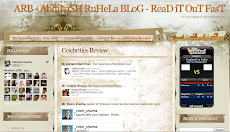This is the copy of the article that THE FREEPRESS JOURNAL published for the book- English Bites by Manish Gupta -->>

This book is the story of a man who goes from being tongue-tied in school to becoming a smooth- talking banker. Through a series of hilarious personal adventures and misadventures, Manish Gupta provides easy solutions to problems faced by language learners.

English Bites: My Fullproof English learning formula
Manish Gupta
Penguin books
Price: Rs 250; Pages: 334
Manish Gupta
Penguin books
Price: Rs 250; Pages: 334
The book by author Manish Gupta, with easy ways to expand one’s word bank, is intended to add over 1,000 words to the reader’s vocabulary, improve general knowledge with amusing trivia and uses fun learning tools like jokes and anecdotes.
Also, the book highlights a trend of how the medium of instruction is English but the medium of memorising, understanding and responding is in the vernacular. The thoughts in vernacular are then translated into English. This thought process could be a reason why some persons speak the way they do and why it also takes longer than a normal conversation because the speaker without the fluency of the language is left searching for an appropriate word to express himself or herself.
Then there is the trend wherein students switch to the vernacular when the next teacher gets delayed for a lecture. So parents who want their children to learn English quicker should discourage this trend. After all, there are always opportunities galore at home and other places where children could speak in the vernacular or the mother tongue. But to attain perfect command of English in terms of speech, grammar, vocabulary and pronunciation, if possible, learning should not be limited merely to the academic sphere.
A tip for students who wish to improve their command over the language – There are always some persons who are adept at the language and conversing with them on a more regular basis would make it second nature and they could then improve upon all the above-mentioned aspects.
Some approach the learning of the language as with every other academic pursuit – but is cramming the only way out? To add to the confusion, there are words like cavern-tavern, plaint-pliant, jaunt-jaunty, idle-idyll and words that may have more than one meaning. It could be ‘hot as hell’ one day and ‘cold as hell’ the other. But it is after all a language that has travelled and evolved a great deal, rapidly taking in words and concepts from other cultures.
In such a scenario, this book offers invaluable tips and says that merely limiting oneself to academia will not help and that devoting time on a regular basis on a varied diet of books, magazines and newspapers will better suit the purpose. A simple and very effective technique to extract the best of such readings: Every time you encounter a new word, pause at it, give it a long hard look, make a mental impression of the situation, and conjecture its meaning from this imagined situation.
Finally validate your thought by referring to a dictionary. But what if one were to keep coming up with such incomprehensible words on every page? Since jotting down all these words would imply constant interruptions and affect the easy flow of reading, it would be better to jot down all these words and later look them up in a dictionary.
As a case in point, newspaper editorials can be a gold mine of tough English words and they also add to one’s knowledge since editorials are written keeping in mind contemporary issues and topics of national interest. In this context, making the reader take a trip down memory lane about the ‘Word Power’ column in Reader’s Digest, the author says that it was quite depressing since even with the liberal self-marking, he could not get more than five correct answers out of the 15 posers. In order to score a perfect 15, he started to explore bookstores and libraries for books on interesting techniques to build one’s vocabulary.
In the book, the reader is also introduced to how some words such as chauffeur evolved. In the era of steam engines, a person used to feed coal to the combustion chamber to raise steam and after vehicles evolved from being powered by steam to running on gasoline, the coal feeder or stoker got elevated to being the driver of the car, or the chauffeur. The book is thus full of such nuggets.
So whether you’re a vernacular speaker or a GRE/GMAT/CAT/XAT aspirant, this book will help expand your vocabulary and improve your verbal ability.

.JPG)

0 comments:
Post a Comment